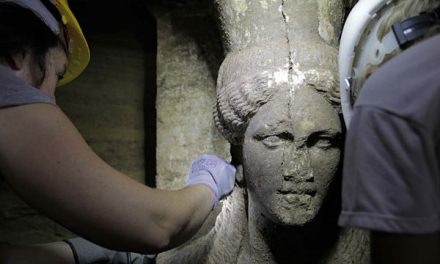The New York Times
Destabilized by scandals yet held together by a lack of alternatives, the Greek government prepared to push a raft of politically toxic new austerity measures through Parliament on Wednesday, a move aimed at securing international financing and ensuring that the debt-wracked nation will remain in the euro zone.
But some members of Prime Minister Antonis Samaras’s fragile three-party coalition government were expected to break ranks and vote against the measures, reviving questions about how long the coalition can hold together.
On the streets, austerity-weary Greeks kicked off two days of nationwide strikes on Tuesday to protest the new measures, which will total $23 billion over the next four years.
The measures, which are expected to pass by a razor-thin margin in Parliament, are required to unlock $40 billion in rescue financing that the country needs to meet expenses. The European Union’s commissioner for economic and monetary affairs, Olli Rehn, said in Brussels on Monday that lenders were on track to release the aid.
But with so many volatile elements in play, including a series of interlocking scandals in Greece that are gaining momentum, analysts said that it was unclear if the Samaras government could survive under the pressure. “All systems are in critical condition, even the smallest thing can destabilize the system or the government,” said Paschos Mandravelis, a columnist for the daily newspaper Kathimerini.
Even as they jockey over a new round of austerity, leaders are under fire for failing to crack down on high-level tax evasion, after they were handed a list two years ago of more than 2,000 Greeks said to have Swiss bank accounts.
Called the Lagarde list, after Christine Lagarde, the International Monetary Fund chief who provided the information, it was published last week by the magazine HotDoc, prompting the arrest and rapid acquittal of the publication’s editor. The entire affair has done substantial damage to the already weakened Socialist Party, the second largest in Mr. Samaras’s coalition. Two Socialist finance ministers — Evangelos Venizelos, the current Socialist leader, and George Papaconstantinou, his predecessor — are under fire for failing to act on the list.
Most analysts said they believed the government would hold up for now. But two other rival parties are gaining ground in opinion polls. If the country were to hold new elections today, the leftist Syriza party — which has risen rapidly from virtual obscurity on a platform of repudiating Greece’s bailout but staying in the euro — would place first, followed by Mr. Samaras’s New Democracy Party, the polls suggest.
Since claiming power in June, Mr. Samaras has labored to restore Greece’s credibility with its European partners, particularly with Chancellor Angela Merkel of Germany, who has insisted that Greece remain a part of the euro zone.
“It’s clear that this government is making all the right noises,” said Mujtaba Rahman, Europe analyst at the Eurasia Group. “They’re much more credible, and creditors are happy with the progress they have made.” Nevertheless, he added, even when the next wave of financial aid arrives, “Greece is not at all out of the woods.”
The new austerity measures, which include further cuts to pensions, civil service salaries and social benefits, are expected to reduce gross domestic product by 9 percent, dealing a new blow to an economy entering its sixth year of recession and likely adding to an unemployment rate already exceeding 25 percent. A total of $17 billion in cuts and tax increases will be put into effect in the next two years. But because the Greek economy is shrinking even faster than expected, an additional $4.5 billion in austerity measures will be required between 2015 and 2016 to meet the country’s fiscal targets.
As matters stand, Greece is still staggering under a mountain of debt, which is expected to rise to 189 percent of gross domestic product in 2013, from 175.6 percent now, as interest piles up on all the loans Greece must repay. The deficit next year is expected to swell as well, to 5.2 percent of G.D.P. from a forecast of 4.2 percent.
Other euro zone governments have discussed forgiving some or part of the nearly $68 billion in loans they made to Greece, a step that many economists regard as inevitable if Greece is ever to emerge from its fiscal straitjacket. But it is considered politically unpalatable, especially in Germany, where Ms. Merkel faces an election next year.
Meanwhile, the bulk of new aid — $30 billion — is going directly into Greece’s feeble banks, which must be recapitalized after sustaining severe losses this year when the government halved the value of Greek bonds that the banks had been required to hold.
Mr. Samaras has said the infusion will help the banks revive the economy by lending again to businesses, after tens of thousands of small and medium-size firms collapsed amid a lack of liquidity.
But Constantine Mihalos, president of the Athens Chamber of Commerce, said that was unlikely. “The funds can help improve the health of the banks, but that is not sufficient to provide liquidity even in terms of working capital, which is of essential importance for companies,” he said.
The vote comes amid growing polarization in Greece between the country’s elite, many of whom keep their savings abroad, and ordinary Greeks who feel they are suffering unduly for the country’s political failures. The measures include a proposal to raise the fares on all public transportation and to reduce benefits to families with children.
The retirement age will rise to 67 from 65, and the current pool of 665,000 civil servants will be reduced by 80,000 through 2016. The most disputed measures involve changes to labor laws that would allow private employers to negotiate salaries beyond collective labor agreements; the abolition of a 10 percent salary increase for employees who marry; and a reduction of severance for workers at private firms.
The measures have rankled people like Yiannis Antivasis, 45, a craftsman who makes brass lighting fixtures for a small business in Peristeri, in western Athens, and his wife, Maria Sifaki, 39, who is unemployed and has multiple sclerosis.
Mr. Antivasis has had his salary reduced by 35 percent in the past two years, to $1,150 a month, and will see his income slashed further under the new measures. “We’ve gone back to the Middle Ages,” he said. “They’re demolishing everything.”
The cuts to pensions heralded in the new bill worry the couple, who have relied on some support from their parents in the past. “My father already had his pension cut, and I’m not sure how he’ll cope if they cut it again,” Mr. Antivasis said, adding that his father had asked him for money for the first time this summer.
While austerity has been imposed on the Greek people before, “the difference this time is that people are at their wits’ end,” Mr. Antivasis added. “People are ready to go out on the street with guns.”
Related Articles
Greek workers strike over austerity measures



















